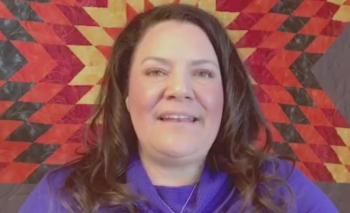Image Caption
Summary
Local Journalism Initiative Reporter
Windspeaker.com
Beginning on Thursday, Sept. 24, the non-profit First Nations Health Managers Association (FNHMA) is launching a series of 12 weekly virtual town halls that will provide up-to-date COVID-19 information across Canada’s Indigenous population.
The meetings are for “frontline health workers, health managers and Indigenous communities nationally”, read a media advisory.
The series will be a continuation of a program started in March that ran until late June, which featured 14 weekly sessions.
FNHMA describes the town halls as “an opportunity for us all to check in regularly, exchange reliable information, and identify the collective needs of our Peoples and Communities.”
Thursday’s town hall can be accessed via the Indigenous Health Today website, available here. Each town hall will start at 1 p.m. Eastern Time and will run for approximately an hour. Watch also for a link on the Facebook pages of Windspeaker, Windspeaker Radio CFWE and Windspeaker Radio CJWE on broadcast day.
It will also be broadcast on the Aboriginal Peoples Television Network’s (APTN) National News Facebook page.
Marion Crowe, who serves as the CEO for FNHMA and is the moderator of each session, said the motivation behind the town halls was pretty straightforward.
“We felt a need to get information out to those that we serve,” she said.
While the town halls were initially targeting those working in the health industry, Crowe said she was pleasantly surprised with the reception they received from the general public, as the initial series often hit 15,000 to 20,000 live viewers across the various platforms.
Crowe said the demand for a second series came with a recent rise of COVID cases nationally, particularly with Ontario’s recent rise in cases, as well as students return to the classroom.
Crowe emphasized that now is not the time to let up in what she called a “marathon” fight against the virus.
“I know that the messages are getting old, but we still have to adhere to all of the practical advice that we’ve had in terms of social distancing,” Crowe said. “Staying that fishing rod distance, that moose-length distance away from other folks, keeping our bubbles really small, washing our hands diligently, and wearing those face masks when out in public. Let’s all continue to make strides at winning this fight against COVID-19.”
Crowe said the incoming flu season is another anticipated public health challenge, but offered simple advice in order to stay protected.
“Go get vaccinated,” she said. “It’s so important that we see our vaccination rates at the best they’re ever going to be this year.”
Thursday’s town hall will consist of four health professional speakers: Dr. Evan Adams, the Deputy Chief Medical Officer of Public Health at Indigenous Services Canada, Mary Deleary, Training and Education Manager at Thunderbird Partnership Foundation, Marika Nadeau, the director of the General COVID-19 Task Force at Health Canada, and Adrianne Lee, who works in Design research at Canadian Digital Services.
In particular, Nadeau will be speaking about the COVID Alert mobile application that tracks potential exposures to positive individuals via a phone’s Bluetooth connection. The app was launched in early August nationally, but has had a slower-than-anticipated download and rollout.
To answer specific questions, there is both a live chat feature on the livestreams as well as the possibility to email questions in beforehand to FNHMA@ihtoday.ca.
In order to be accessible to people who may not have suitable bandwidth to stream the town hall, several Indigenous-operated radio stations across the country will also be carrying the meetings live each week or will rebroadcast them.
Alongside the town halls, the FNHMA is planning another initiative for early November.
On Nov. 4, a three-hour virtual celebration is planned to recognize all health workers and new certified First Nations Health Managers. The virtual celebration replaces an annual in-person three-day conference that was cancelled due to the pandemic this year.
Local Journalism Initiative Reporters are supported by a financial contribution made by the Government of Canada.

